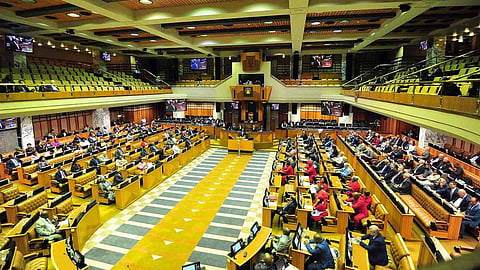SA’s Parliament: Shambolic governance and the urgent energy crisis
Patrick McLaughlin discusses the current state of South African governance, with a particular focus on Parliament. McLaughlin argues that amidst a flurry of proposed legislation, changing government policy, and international posturing, the only truly important issue facing Parliament at the moment is the energy crisis. McLaughlin also critiques the leadership of Speaker Nosiviwe Mapisa-Nqakula, who has been accused of openly defying constitutional requests and ignoring parliamentary undertakings. Furthermore touching on the dangers of allowing political ideologies to trump the country's interests and the importance of parliamentary oversight in ensuring accountability and preventing abuse of power.
Parliament muzzled on energy issue
By Patrick McLaughlin*
There is so much in the parliamentary inbox at the moment regarding proposed legislation, changing government policy, international posturing and even TV coverage in news time on escaping prisoners, that it is difficult to know what is important to business, just merely entertaining or what to ignore as rubbish.
All the same, any businessperson with an ounce of common sense knows that its time for politicians to get real, stop playing in the sandpit, and focus on doing some governing – for which they are paid handsomely. Everybody is worn out with surprises. There is only one really serious issue for Parliament at the moment and that is the energy failure. As BUSA's Cas Coovadia said, " Mr President. Let us talk. And it's not a negotiation."
The one thing totally evident from two political conferences was how shambolic South African governance is becoming. Nowhere is it more evident than in Parliament under the inept leadership of Speaker Nosiviwe Mapisa-Nqakula, who has given up on any shadow of impartiality. She openly defied the constitutional request for Parliament to produce a satisfactory Electoral Reform Bill and has ignored all requirements placed upon her to follow up with urgency on the Zondo Report, a parliamentary undertaking for which she is responsible for both a parliamentary response and its implementation.
In addition, we have seen recently some really absurd parliamentary meetings taking place with bizarre subjects such as Malema's attempt to stop the world; the defence minister playing naval war games with Russia and China threatening preferential trade with the US and the EU; then a mindless Q & A with the ex-minister of tourism on a R1bn deal about to be signed with Tottenham Hotspurs.
In the middle of all this nonsense, a major issue seems to be gathering pace within the ANC/SACP alliance and now squaring up with Parliament; an issue well below the water line and with only one-seventh visible. It appears to be a growing problem. Whilst there are always politicians around who wish to isolate parliament and totally ignore the judiciary, this particular dark cloud comprises politicians who place their ideologies way ahead of the country's interests and wish to by-pass parliamentary independence.
For example, with an energy crisis upon us instead of a pandemic, President Ramaphosa proclaimed another national state of disaster which gave again a selected group of such politicians an almost free hand. As Moneyweb said, "With Nkosazana-Zuma back in the driver's seat, what could go wrong?"
Following this proclamation there occurred a superficial cabinet change and more secret meetings, then more delays and suddenly without any proclamation there was no more state of disaster and no more Nkosazana-Zuma. This time, by the skin of our teeth, we were safely back again with democracy.
In the meanwhile, President Ramaphosa warned once again during the emergency on attempts to undermine the security of the state; in the first case referring to the KZN uprising and in the second, ostensibly because of looting at Eskom. Fortuitously, it seemed, the powers granted in the latter case enabled a major police display to head off trouble with the EFF. Consequently, with all the political confrontations, the major difference between a state of disaster and a state of emergency has become lost in the translation.
What we do understand is that the criteria for a state of disaster allows by law extra powers to the cabinet in order to speed up relief, bring about faster procurement of relief supplies and to help with the avoidance of red tape. We also know for sure, in retrospect, that the cutting out of parliamentary oversight, in the name of both Covid and speed, resulted in the taxpayer being robbed blind.
In the recent case, how the ducking of parliamentary oversight could really help any energy crisis is still mysterious. It has only been the result of parliamentary pressure that all PMFA requirements imposed in law on Eskom tender requirements that normality was restored, surely a good example of power abused. The call therefore made by President Ramaphosa was either a really bad one and rather devious, or a complete over re-action to a security scare the nation knew nothing of.
Whilst Parliamentary oversight may slow things down, a state of disaster/emergency can be similar to a public company without an auditor. Such powers should surely not be entrusted to any political party in the year leading up to national elections. Since 1994, the country has seen thirteen ministers of energy, the relationship with Parliament worsening all the time. The present incumbent, Gwede Mantashe, has a record of avoiding Parliament at every opportunity, his department of mineral resources and energy having only now a distant relationship.
Whilst the TV coverage on the Thabo Bester escape from the Mangaung prison was certainly not an example of a typical working day in Parliament, an example of good oversight came from Adv. Glynnis Breytenbach, who stared down both a minister and a commissioner stating, "You should all be ashamed of yourselves."
*Patrick McLaughlin started Hof ten years ago, monitoring Parliament for major business institutions. Hof Communications supplies parliamentary affairs and government policy updates in the form of its private publication, "ParlyReport"

